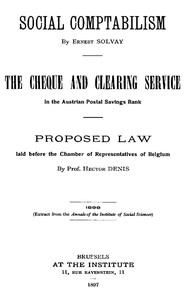Social Comptabilism by Ernest Solvay and Hector Denis
"Social Comptabilism" by Ernest Solvay is a scientific publication written in the late 19th century. The work explores the theoretical foundation of a new economic system that proposes replacing traditional money with a system of bookkeeping transactions, which it claims could offer significant advantages without the disadvantages of currency. The primary focus lies in analyzing how transactions could function without the necessity of money, emphasizing the idea of maintaining records of value
and credit through a system referred to as “social comptabilism.” The opening of the work introduces the concept of replacing money with an account-keeping system that theoretically would allow for transactions to be conducted without physical currency. Solvay begins by discussing the role of money in society, arguing that it is mainly beneficial for commercial transactions and is not strictly necessary for all individuals. He posits that if transactions could be recorded legally and efficiently in a bookkeeping manner, money itself could become obsolete. The text outlines the theoretical implications of such a system, suggesting that it could simplify trade and improve economic relations without the complications brought about by the fluctuations of monetary value. The work aims to lay the groundwork for a practical application of these ideas, including examples from existing systems in Austria. (This is an automatically generated summary.)
Read or download for free
| Reading Options | Url | Size | |||
|---|---|---|---|---|---|
| Read now! | https://www.gutenberg.org/ebooks/45824.html.images | 237 kB | |||
| EPUB3 (E-readers incl. Send-to-Kindle) | https://www.gutenberg.org/ebooks/45824.epub3.images | 709 kB | |||
| EPUB (older E-readers) | https://www.gutenberg.org/ebooks/45824.epub.images | 708 kB | |||
| EPUB (no images, older E-readers) | https://www.gutenberg.org/ebooks/45824.epub.noimages | 127 kB | |||
| Kindle | https://www.gutenberg.org/ebooks/45824.kf8.images | 966 kB | |||
| older Kindles | https://www.gutenberg.org/ebooks/45824.kindle.images | 951 kB | |||
| Plain Text UTF-8 | https://www.gutenberg.org/ebooks/45824.txt.utf-8 | 224 kB | |||
| Download HTML (zip) | https://www.gutenberg.org/cache/epub/45824/pg45824-h.zip | 694 kB | |||
| There may be more files related to this item. | |||||
Similar Books
About this eBook
| Author | Solvay, Ernest, 1838-1922 |
|---|---|
| Author | Denis, Hector, 1842-1913 |
| Title |
Social Comptabilism The Cheque and Clearing Service in the Austrian Postal Savings Bank. Proposed Law laid before the Chamber of Representatives of Belgium |
| Credits |
Produced by Richard Tonsing, Adrian Mastronardi and the Online Distributed Proofreading Team at www.pgdp.net (This file was produced from images generously made available by The Internet Archive/American Libraries.) |
| Reading Level | Reading ease score: 49.9 (College-level). Difficult to read. |
| Language | English |
| LoC Class | HG: Social sciences: Finance |
| Subject | Postal savings banks |
| Subject | Postal savings banks -- Austria |
| Category | Text |
| EBook-No. | 45824 |
| Release Date | May 30, 2014 |
| Most Recently Updated | Oct 24, 2024 |
| Copyright Status | Public domain in the USA. |
| Downloads | 392 downloads in the last 30 days. |
| Project Gutenberg eBooks are always free! | |

